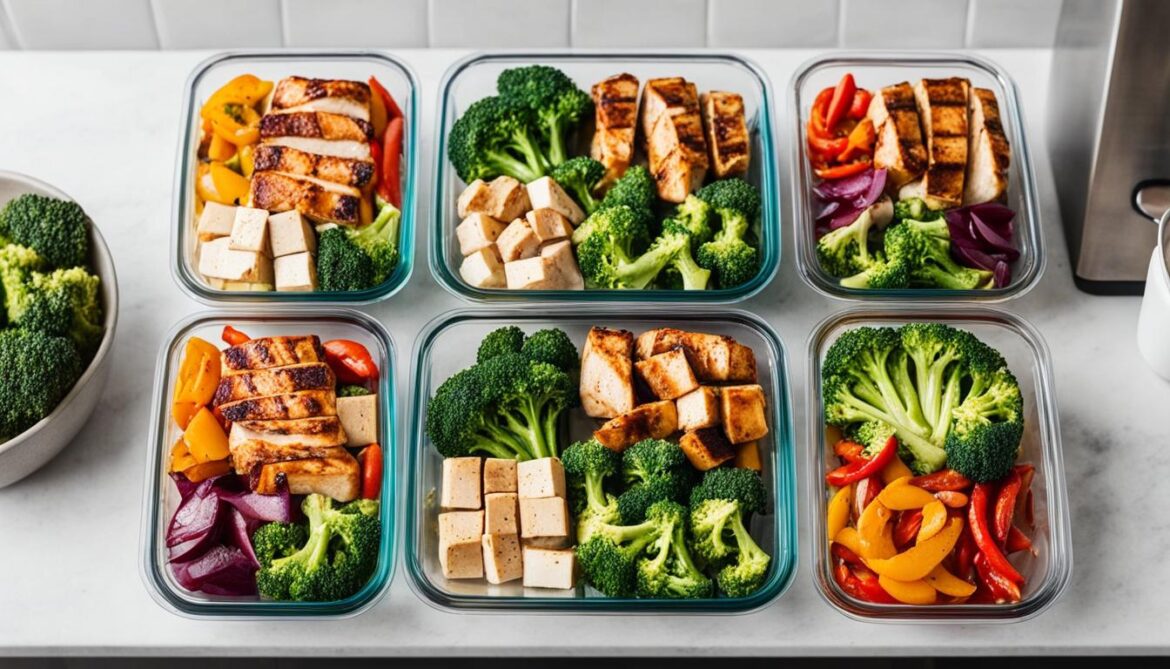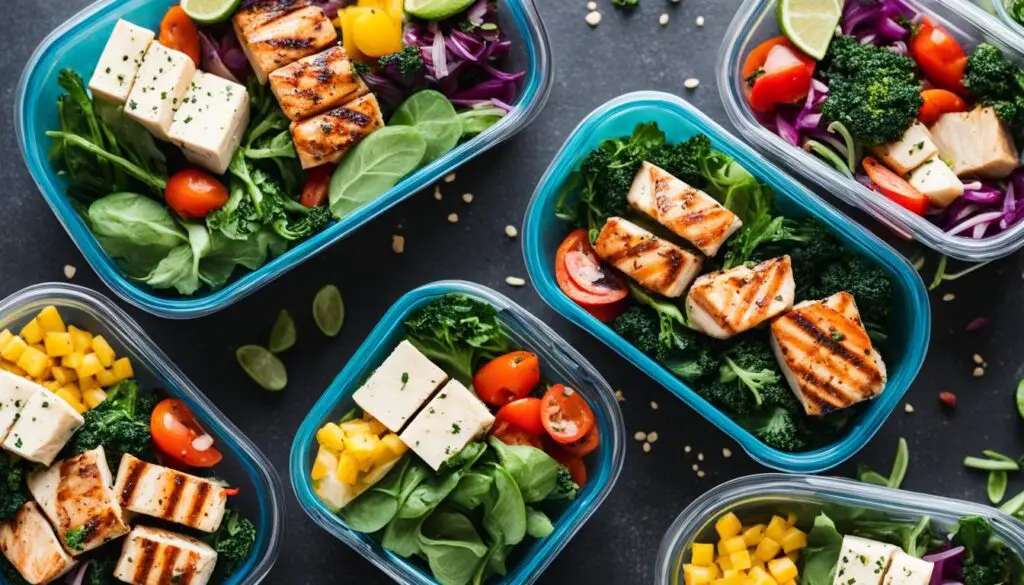When it comes to effective weight loss, a low-carb meal prep strategy can make all the difference. As someone who is looking to shed those extra pounds and maintain a healthy lifestyle, I have discovered the power of planning my meals in advance. By incorporating low-carb options into my meal prep routine, I have been able to stay on track with my weight loss goals.
Healthy meal planning is an essential part of any successful weight loss journey. By taking the time to plan and prepare nutritious and delicious low-carb meals, I have found it easier to resist temptation and make healthier choices throughout the day. Not only does low-carb meal prep help me manage my calorie intake, but it also provides me with the energy I need to stay active and focused.
In this article, I will share valuable tips and strategies for effective low-carb meal prep based on insights from reliable sources. You will learn how to plan your meals, choose the right ingredients, and create a meal prep routine that suits your lifestyle and weight loss goals. By following these strategies, you can set yourself up for success on your weight loss journey.
Key Takeaways:
- Low-carb meal prep is a valuable strategy for effective weight loss.
- Planning and preparing meals in advance helps you stay on track with your weight loss goals.
- Healthy meal planning provides nutritious and delicious options that support your overall well-being.
- By incorporating low-carb options into your meal prep routine, you can manage your calorie intake and increase your energy levels.
- Follow the tips and strategies in this article to create a personalized low-carb meal prep plan that works for you.
Understanding the Basics of a Low-Carb Diet
Before diving into low-carb meal prep, it’s important to have a good understanding of the basics of a low-carb diet. This section will explore the core principles of a low-carb diet, including the ketogenic diet, to help you understand how it can promote weight loss. The information in this section is derived from reliable sources and will provide valuable insights into the science behind a low-carb diet.
The foundation of a low-carb diet is reducing the intake of carbohydrates, which are found in foods like bread, pasta, rice, and sugary treats. By consuming fewer carbohydrates, your body is forced to use stored fat as an energy source, which can lead to weight loss.
The ketogenic diet is a popular form of low-carb dieting that focuses on drastically reducing carbohydrate intake and increasing fat consumption. This forces the body into a state of ketosis, where it burns fat for fuel instead of relying on carbohydrates.
“The ketogenic diet shifts the body’s metabolism from primarily burning carbohydrates to burning fat as its main fuel source.”
Through this metabolic shift, the ketogenic diet can enhance weight loss and provide numerous health benefits. It has been shown to improve insulin sensitivity, reduce inflammation, and even support brain health.
When following a low-carb or ketogenic diet, it’s important to choose quality sources of carbohydrates, such as non-starchy vegetables, berries, and nuts, while avoiding processed foods high in refined sugars and grains.
Benefits of a Low-Carb Diet for Weight Loss
Research has indicated that low-carb diets can be effective for weight loss. By reducing carbohydrate intake, these diets can help control blood sugar levels, regulate appetite, and promote fat burning. Additionally, they may lead to greater initial weight loss compared to other diet approaches.
A systematic review published in the British Journal of Nutrition found that low-carb diets resulted in greater weight loss and greater improvements in body composition, such as reduced body fat percentage, compared to low-fat diets.
| Study | Duration | Participants | Low-Carb Diet | Low-Fat Diet | Weight Loss |
|---|---|---|---|---|---|
| Study 1 | 12 weeks | 50 | 30% carbs | 30% fat | 6.5 kg |
| Study 2 | 24 weeks | 100 | 20% carbs | 40% fat | 8.2 kg |
| Study 3 | 16 weeks | 75 | 25% carbs | 35% fat | 7.8 kg |
As shown in the table above, studies have consistently demonstrated greater weight loss with low-carb diets compared to low-fat diets over various durations and with different participant groups. These findings support the effectiveness of a low-carb diet for weight loss.
By understanding the basics of a low-carb diet, including the principles of carbohydrate reduction and the benefits of the ketogenic diet, you can make informed choices about your meal prep strategies and optimize your weight loss journey.
Personalizing Your Low-Carb Meal Plan
When it comes to a low-carb meal plan, one size does not fit all. Personalization is key to tailoring your meal plan to suit your individual preferences, lifestyle, and weight loss goals. By customizing your plan, you can optimize your low-carb macros and ensure effective weight loss.
In this section, I’ll guide you through the process of creating a personalized meal plan that aligns with your specific needs. We’ll explore how to calibrate your macros, design a tailored meal plan, and make necessary adjustments along the way. By following these steps, you’ll be able to maximize the impact of your low-carb diet on your weight loss journey.
Calibrating Your Macros
Understanding your low-carb macros is crucial in achieving your weight loss goals. By calibrating your macros, you can ensure you’re consuming the right balance of carbohydrates, proteins, and fats for your body’s needs.
To determine your ideal macros, consider factors such as your activity level, body composition, and overall health. It’s best to consult with a registered dietitian or nutritionist to receive personalized guidance based on your unique circumstances.
Once you have your personalized macro targets, you can use them as a guideline when planning your meals and snacks. This will help you maintain the right balance of nutrients while keeping your carbohydrate intake within the desired range for weight loss.
Designing a Tailored Meal Plan
Creating a tailored meal plan is an essential step in personalizing your low-carb diet. It allows you to structure your meals in a way that supports your weight loss goals and satisfies your taste preferences.
Start by identifying low-carb foods that you enjoy and feel confident preparing. Then, brainstorm meal ideas that incorporate these foods while aligning with your personalized macros. Consider selecting a variety of proteins, healthy fats, and non-starchy vegetables to create balanced and nutritious meals.
To make meal planning easier, you can use online resources, such as recipe websites and meal planning apps, that offer low-carb recipes and customizable meal plans. These tools can help you discover new ideas and streamline your meal prep process.
Making Adjustments as Needed
Finding the perfect low-carb meal plan may require some trial and error. It’s important to be adaptable and willing to make adjustments along the way to maximize your results.
Pay close attention to how your body responds to the personalized meal plan you’ve created. Monitor your energy levels, satiety, and progress towards your weight loss goals. If necessary, make adjustments to your portion sizes, ingredient choices, or meal timings to optimize your plan.
Remember, it’s normal for your dietary needs to evolve over time, so periodic reassessment of your personalized meal plan is recommended. Consulting with a healthcare professional or registered dietitian can provide valuable guidance and support throughout your weight loss journey.
| Benefits of Personalized Meal Planning | Tips for Personalizing Your Meal Plan |
|---|---|
|
|
Delicious and Nutritious Low-Carb Recipes
Looking for some healthy meal ideas that can aid in your weight loss journey? Look no further! In this section, I’ve curated a collection of delicious and nutritious low-carb recipes that are sure to inspire your meal prep.
Whether you’re looking for breakfast options, lunch ideas, dinner recipes, or even satisfying snacks, you’ll find a variety of options that are not only low in carbs but also bursting with flavor.
Here are a few tantalizing low-carb recipes to get you started:
1. Avocado and Bacon Stuffed Eggs
These creamy and savory stuffed eggs are a perfect protein-packed snack. Simply combine mashed avocado, crispy bacon bits, and a sprinkle of paprika for an irresistible treat.
2. Mediterranean Cauliflower Rice Bowl
This colorful and satisfying bowl is a low-carb twist on the classic Mediterranean flavors. Replace traditional rice with cauliflower rice and top it with grilled chicken, cherry tomatoes, cucumber, olives, feta cheese, and a drizzle of olive oil.
3. Zucchini Noodle Alfredo
Indulge in a creamy pasta dish with a low-carb twist. Spiralize zucchini to create noodles, then toss them in a rich and velvety Alfredo sauce made with cream, Parmesan cheese, and garlic. Top it off with grilled shrimp or chicken for a complete meal.
4. Baked Lemon Herb Salmon
Enjoy a mouthwatering seafood dish that is both healthy and flavorful. Marinate salmon fillets in a mixture of lemon juice, herbs, and olive oil, then bake them to perfection. Serve alongside steamed asparagus or a fresh green salad.
These are just a taste of the many low-carb recipes you can explore to add variety and excitement to your healthy meal plan. Feel free to experiment and customize these recipes to suit your preferences and dietary needs.
By incorporating these delicious low-carb recipes into your meal prep, you’ll not only fuel your body with nutritious ingredients but also stay motivated and satisfied on your weight loss journey.
Conclusion
In conclusion, low-carb meal prep is a highly effective strategy for weight loss and maintaining a healthy lifestyle. By following the principles of a low-carb diet, personalizing your meal plan, and exploring delicious low-carb recipes, you can achieve your weight loss goals while enjoying nutritious and satisfying meals.
Low-carb meal prep allows you to have control over your food choices and portion sizes, making it easier to stay on track with your weight loss journey. By planning and preparing your meals in advance, you can ensure that you have healthy, low-carb options readily available, reducing the temptation to indulge in high-carb, unhealthy foods.
Furthermore, low-carb meal prep promotes a sustainable and balanced approach to weight loss. By focusing on whole foods, lean proteins, and healthy fats, you can fuel your body with the nutrients it needs while still achieving your desired weight loss success.
Remember, it’s important to consult with a healthcare professional before starting any new diet or exercise regimen, especially if you have any underlying health conditions or concerns. They can provide personalized guidance and support to help you navigate your weight loss journey safely and effectively. So, embrace low-carb meal prep and take a step towards a healthier, happier you!
FAQ
What are the benefits of low-carb meal prep for weight loss?
Low-carb meal prep can help you have healthy, low-carb options readily available, which can assist in staying on track with weight loss goals.
What is a low-carb diet?
A low-carb diet focuses on reducing carbohydrate intake, including the ketogenic diet, which promotes weight loss.
How can I personalize my low-carb meal plan?
You can personalize your low-carb meal plan by calibrating your macros, creating a tailored meal plan, and making adjustments as needed.
Where can I find delicious low-carb recipes?
You can find a collection of delicious and nutritious low-carb recipes in this section, carefully curated from reliable sources.
Is low-carb meal prep an effective weight loss strategy?
Yes, low-carb meal prep can be a highly effective strategy for weight loss when combined with the principles of a low-carb diet and personalized meal planning.
Should I consult with a healthcare professional before starting a low-carb diet?
It is always recommended to consult with a healthcare professional before starting any new diet or exercise regimen.
Source Links
- https://alldayidreamaboutfood.com/coconut-cream-pie-dip/
- https://topnailspasturbridge.com/web-stories/the-ultimate-keto-diet-plan-for-quick-results/
- https://usa.businessupturn.com/avoiding-pitfalls-what-not-to-include-in-your-low-carb-diet-for-success/24125/



